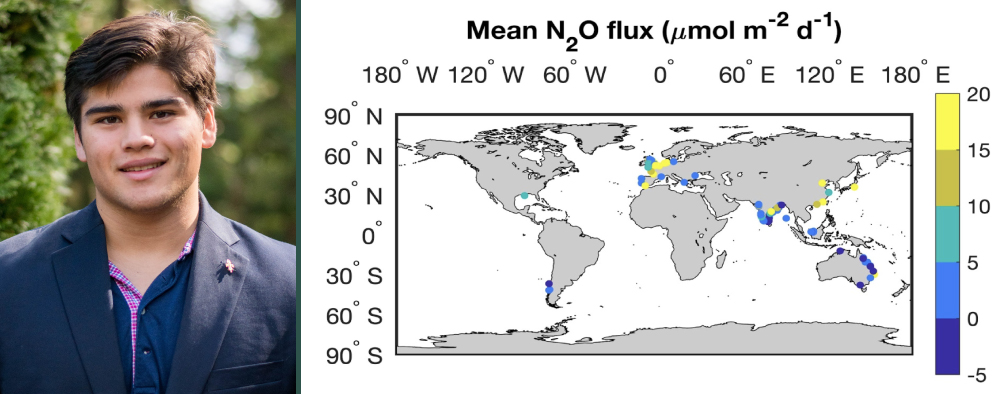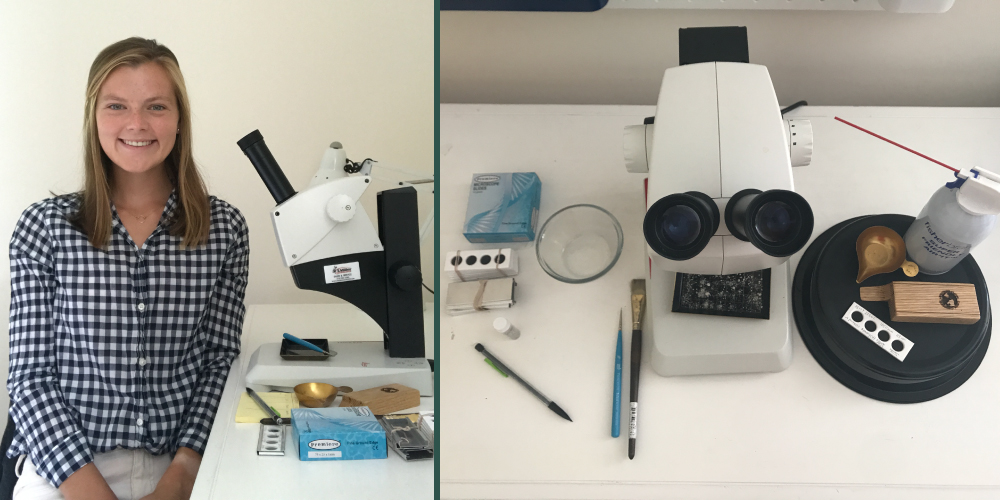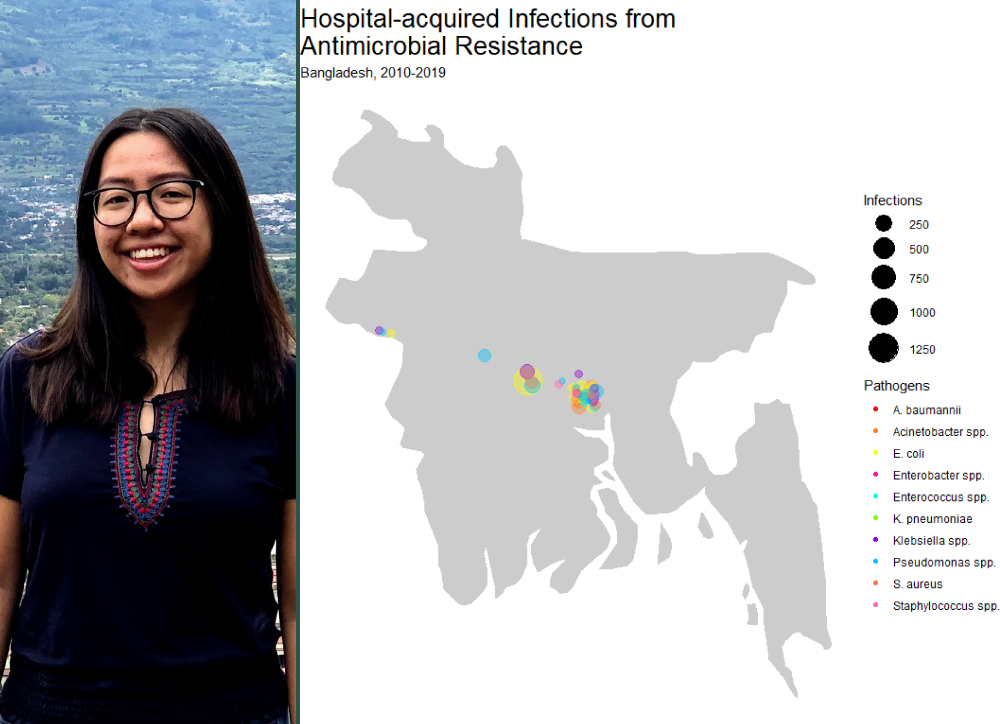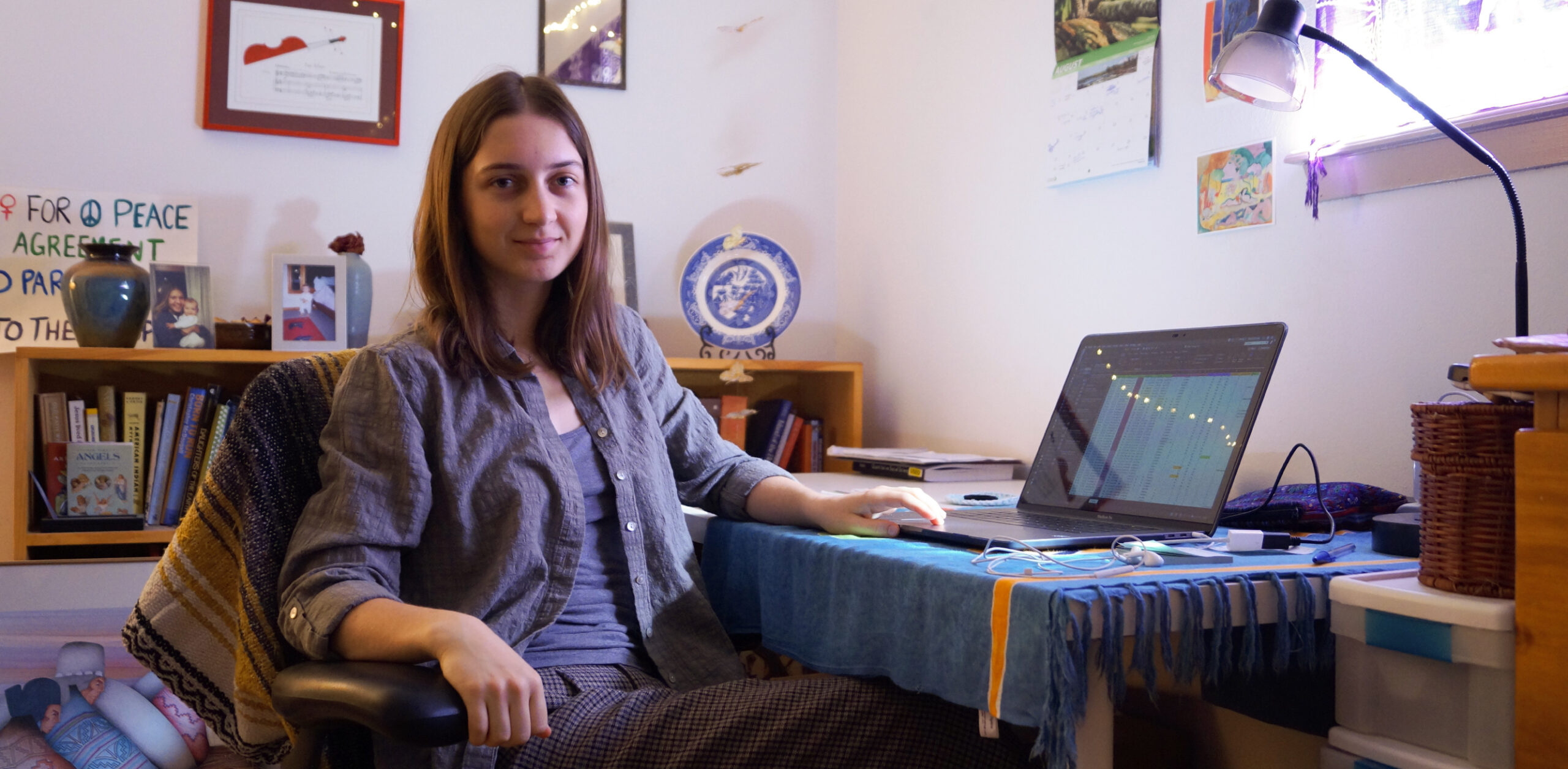Connected virtually, working globally: PEI engaged more than 100 undergraduates in virtual environmental internships for summer 2020
Princeton senior Ben Alessio had planned to spend his summer internship with the Princeton Environmental Institute (PEI) in the laboratory of Professor Howard Stone conducting experiments related to diffusiophoresis, an important process by which particles are transported through water.
But when COVID-19 led to the suspension of campus operations, Alessio and Stone —Princeton’s Donald R. Dixon ’69 and Elizabeth W. Dixon Professor of Mechanical and Aerospace Engineering and PEI associated faculty— designed a virtual internship that contributed to an important advance in the Stone Lab’s work.
Alessio, a physics major, worked from home integrating physical effects into a code that solves the system of partial differential equations that describe diffusiophoresis under various conditions. One physical effect — having many ions in the solute — had never been implemented before.
“The theory behind this was published last year by a researcher in the group, but nobody had done a numerical investigation of the equations. When we saw results that matched the experiments, I was thrilled,” said Alessio, who previously held a PEI internship with the Princeton Plasma Physics Laboratory in 2019.
“Working remotely changed the course of my internship,” he said. “I’m not sure I would have accomplished the same thing with the computer modeling if I were on campus. I would say it was a fortunate result of having to go to computer work.”
Alessio was one of more than 100 Princeton undergraduate students enrolled in the PEI Environmental Internship program this year who — despite transitioning to virtual internships due to the coronavirus — worked closely with noted faculty and other experts on research related to critical environmental topics.
PEI supported 123 students from across the University in positions with Princeton faculty, researchers from other scientific enterprises, government agencies, and not-for-profit organizations and community groups. Their projects focused on global environmental challenges in the areas of policy and resilience, biodiversity and conservation, alternative energy, climate change, water, and human health.
PEI interns for the summer of 2020 presented their research Sept. 18 during the annual Summer of Learning Symposium.


“The highlight of my experience was definitely the weekly meetings with my advisers,” said junior Ryan Eusebi, who worked on a climate modeling project with Gabriel Vecchi, professor of geosciences and the Princeton Environmental Institute. “Watching their minds at work and seeing how they thought problems out was really great.”
Eusebi, a computer science major, worked on developing a statistical model that can explain and predict seasonal hurricane frequencies in a variety of different climate scenarios using sea-surface temperatures. He then applied these statistical models to a variety of climate models to see how climate change could influence the frequency of hurricanes during the next century.
“I’ve always been interested in weather and hurricanes, so this internship seemed right up my alley,” Eusebi said. “It was really great to get firsthand experience in dealing with problems and questions regarding climate that I have always wondered about.”
[Read about sophomore computer science major Katie McLaughlin‘s PEI internship with the Bermuda Institute of Ocean Sciences (BIOS), where she analyzed two years of data to better understand the mechanisms that allow coral to withstand temperature fluctuations, and how that ability could help coral adapt to climate change.]
Senior Diana Dayoub said her upbringing also inspired her work this past summer in the research group of Anu Ramaswami, the Sanjay Swani ’87 Professor of India Studies and professor of civil and environmental engineering and the Princeton Environmental Institute.
Dayoub worked with PEI intern and sophomore Anton Stengel testing various computational tools for locating certain types of infrastructure in satellite imagery. This information provides researchers and policymakers with insights about urban systems — the focus of Ramaswami’s Sustainable Urban Infrastructure Systems Lab — such as locating sources of high greenhouse gas emissions, or examining how a household’s distance from essential services correlates with socioeconomic status, Dayoub said.
“I’m extremely interested in the patterns underlying the unequal provision of infrastructure services in urban areas,” said Dayoub, a student concentrating in the Princeton School of Public and International Affairs.
“Having grown up in a suburb outside Damascus [Syria], I was always acutely aware of the limited water supply, sewage infrastructure and transportation that set us apart from the serviced capital,” she said. “By knowing the distribution of key infrastructures, we can study a wealth of questions related to correlations between this distribution and health, equity and wellbeing.”


Hannah To and Maya Mishra, both juniors, compiled geospatial data on hospital-acquired infections caused by antimicrobial resistance for their internships mentored by Ramanan Laxminarayan, a senior research scholar in PEI.
Working together over Zoom, To and Mishra looked at the resistance that different pathogens have to various antibiotics before converting the data into maps and graphs for an ongoing survey that Laxminarayan and researchers at the Center for Disease Dynamics, Economics and Policy (CDDEP) — a Washington, D.C.-based public health research organization — are conducting on global antimicrobial resistance.
“During the time of the coronavirus, it was interesting to learn about other crucial areas of work that epidemiologists continue to conduct,” said To, an economics major. “As a student who has taken more classes in the social and physical sciences, I found the opportunity to review medical journals very exciting.
“I was particularly interested in learning about antimicrobial resistance because it is a crucial topic in the field of global health,” she said. “I’m hoping to conduct [my junior independent] research on either environmental health impacts, or the effectiveness of environmental regulations.”
Maria Fleury, a junior civil and environmental engineering major, worked remotely investigating the water dynamics of the Stony Brook-Millstone River watershed in Hopewell Township, New Jersey, with her adviser, Amilcare Porporato, the Thomas J. Wu ’94 Professor of Civil and Environmental Engineering and the Princeton Environmental Institute.
“I took this internship because I am generally interested in water issues,” said Fleury, who, as a PEI intern last year, worked on a water project in Kenya through Engineers Without Borders. “I thought it would be interesting to dedicate some more time to understanding ecohydrology, the scientific study of water and ecological system interactions.”


Fleury primarily used soil-moisture and rainfall data collected by The Watershed Institute in Pennington, New Jersey, during the past five years to perform a sensitivity analysis on a soil-moisture model developed by Porporato so that it better represented the dynamics of the watershed. “It was useful to scout out all of the relevant existing information on the region and analyze it so that, hopefully, in the future, we can collect data that will build upon it,” Fleury said.
“A highlight was the close mentorship developed with my adviser and the insight and care he brought to our weekly meetings,” she said. “At a time of much distance, I was grateful to have an adviser who was extremely supportive and appreciative of all of the work that I was doing.”
[Read about how PEI intern Samuel Vasen, a sophomore majoring in ecology and evolutionary biology, worked with The Watershed Institute to create a virtual map of the health and history of different parts of the forest at the Watershed Reserve.]
Ecology and evolutionary biology major Willow Dalehite, a junior, was able to combine her interests in behavioral ecology and ornithology for her internship with PEI associated faculty member Christina Riehl, assistant professor of ecology and evolutionary biology. The Riehl Lab works in Panama studying the reproductive and nesting behavior of greater anis, a bird notable for communally nesting and raising their young.
Dalehite worked from home reviewing video footage from various nests to study instances in which multiple adults tried to feed nestlings at the same time. This behavior often results in conflict among the adults for control of the prey that they bring back to the nest, Dalehite said. She was interested in the factors that cause adult conflict and its possible implication on how food is allocated to nestlings.
“The topic I chose related to other projects in the lab, yet I looked at a specific aspect they hadn’t really explored in detail. That combination made what I did interesting and rewarding to me,” Dalehite said.
“Although I was unable to experience what it was like to collect data in the field, I was still actively observing and studying greater ani behavior, which is pretty cool,” she said. “The other aspects of the field experience — developing a research question and methodology — were still integral to the work I was doing from home.”




